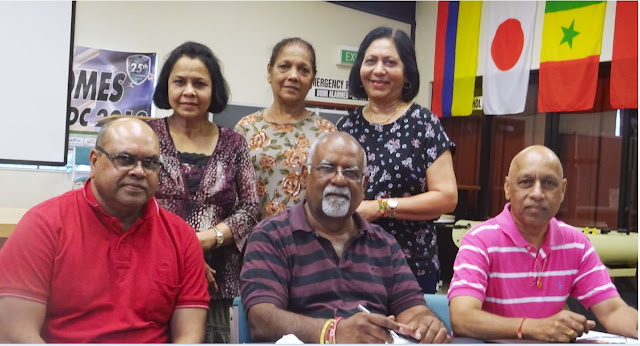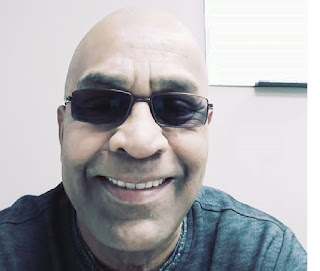Guest Writer - Harnam Singh Golian
[Speech during Diamond Jubilee of Khalsa
College, Ba Fiji on 15 June, 2019, as Chief Guest]
Khalsa College may be one of the earliest educational institution established by the Sikhs of Fiji outside India.
The Fiji Sikhs known as Punjabi’s particularly of the western districts of Lautoka, Ba and Tavua in the mid-1950s of British Era, although small in number, was a vibrant community. Because of the scarcity of schools many school-age children could not get admission hence deprived of formal education. Realising the importance of formal education, the Punjabi community seriously decided to do something as a service to the Indian community.
It was also a challenge for our martial community as well as their Girmitiya brethren who had experienced deprivation together were kept behind socially, economically and politically.
 |
| The Diamond Jubilee (60th Anniversary) plaque that Harnam Singh Golian unveiled on 15 June, 2019 |
The Sikhs all over the world are known for their hospitality, kindness and charity a practice that derives from the teachings and philosophy of Sri Guru Nanak Dev Ji – The Gurmat- a Sikh is inspired with courage to uphold the traditional values in the service of the humanity.
 |
| The Chief Guest and Khalsa Fiji stalwart, Sardar Harnam Singh Golian |
Having all that in mind the elders congregated from time to time at the Tagi Tagi Gurdwara (temple) and resolved that children should get a balanced education to lead a meaningful life without any prejudices of colour, caste or religion or any other form of discrimination.
Hence, they formed the Sikh education society of Fiji and established the Khalsa Primary and Khalsa College.
 |
| At the plaque unveiling ceremony: From left, Chief Guest Harnam Singh Golian, School Manager, Dalabar Singh, School President, Prem Singh and Ranjit Singh Raagi (back) |
I would also like to mention the names of my colleagues Late Mr. J. K. Singh, along with other members of the institution, Mr. Gurmej Singh Virk, who now lives in USA, Late Mr. Balwant Singh Chahal also lived in the USA –for their wisdom, hard work and togetherness with resolute commitments.
I had the honour and privilege to serve as a secretory of the founders of the institution under the presidentship of:
Late Bakshi Singh, known as Bassu
Late Sardara Singh both at the Khalsa institution and Tagi Tagi Gurdwara.
And Late Bhagat Singh Dhadda
 |
| Sardar Harnam Singh Golian (left) unveiling the Diamond Jubilee Plaque, while Khalsa College Manager, Dalabar Singh looks on. |
It is true that these values and principles have played a fundamental role in enhancing Fiji’s progress and continued peace and prosperity in our beautiful Islands, maintaining harmonious relationship. In this respect the Punjabi community has played an integral part in building bridges among the races spreading the message of oneness that one light is the light of all.
A quote from Gurbani
Ek Purab Mai Tera Dekha
Thoo Sabhna Meh Rabanta
I Have Seen One Glory of Yours
That You Are Pervading and
Permeating in All
Sggs 596
THE VALUE OF EDUCATION: Quotes and great thoughts
Mahatma Gandhi:
Education means all round drawing out the best in child and man body and spirit as such education becomes the basis of personality developments on all dimensions, moral, mental and emotional. Therefore, we can say that long run education forms foundation on which castles of peace and prosperity are built since ancient times.
It is said: “Sa Vidyya Yavimukatye” which means that with education we finally attain liberation
Gurbani
Viddia – Vichari Tan Par Upkari
Contemplate and reflect upon knowledge, and you will become a benefactor to others.
Swami Vivekananda
A nation is advanced in proportion to education and intelligence spread among messes”.
Nelson Mandela
Education is the most powerful weapon which you can use to change the world. The power of education extends development of skills we need for economic success. It can contribute to Nation Building and Reconciliation.
Achievements of College under Principal of Jogindar Singh Kanwal
Khalsa College under the principal-ship of Late Mr. J.S. Kanwal has produced many Accountants, Teachers, Doctors, Scientists, Journalists, Bureaucrats, Lawyers, a Magistrate, a Judge, numerous Community Leaders and members of parliament (MPs)
Many of them are in Government services in Fiji as well as abroad, both in Government and in the private sector.
Thanks to vision of our forefathers whose inclination towards education made their children and grandchildren successful, not only in Fiji but outside wider world in many corners of the World where they settled. This Fiji Indian Diaspora, wherever settled, they have retained and maintained their culture, tradition of hard work, and friendliness inculcated by their ancestors.
The Khalsa Schools also taught Indian traditional Art, as well as exhilarating heart throbbing Punjabi Folk dance Bhangra which is a form of entertainment all over the world.
International Khalsa Reunion in Auckland in November, 2019
I bring greetings from a group of former Khalsa students who met in Auckland on 28 November 2018 and decided to form a Khalsa Ex-Students Association with the following office bearers.
Chairman: Madhavan Raman
Vice-Chairman: Dinesh Chand
Secretary: Satish Chand
Assistance Secretary: Asha Singh
Communications and Media Officer: Thakur Ranjit Singh
The committee has decided to hold Khalsa Re-Union in Auckland on 23 November 2019 at the Mangere Centre Park Sports Stadium, 161 Robertson Road, Mangere, Auckland.
All former students, former teachers and their respective spouses from around the world are invited and welcome to attend.
For inquiries please email: khaisabafijinz@gmail.com or call Thakur on +6421 235 4559
This will also coincide with the Gurpurab the 550th celebration of Guru Nanak Dev Ji.
On this auspicious occasion of the Diamond Jubilee celebration, let us remember all those pioneers who contributed in one way or another in the establishment of these institutions.
Let us pay our respect and pray for all those great souls who are no longer with us but have left the legacy behind for the current and future custodians to maintain the tempo and undertake future developments of our prestigious institution. We salute them for their vision.
I wish you all the best in your future endeavors, May Waheguru’s Blessings always prevail upon you.
[About the Author: Harnam Singh Golian is a very well-known community leader and philanthropist, a Former Member of Parliament in Fiji (MP) and a successful businessman in Fiji (formerly Sardar Trading in Raiwaqa, Suva) and now Golian Consultants in Royal Oak, Auckland. He is also author of various publications. He was the Chief Guest at Khalsa College in Ba, Fiji for unveiling Golden Jubilee (60th Anniversary) Plaque. This is a slightly abridged version of his speech, edited by Thakur Ranjit Singh]





























